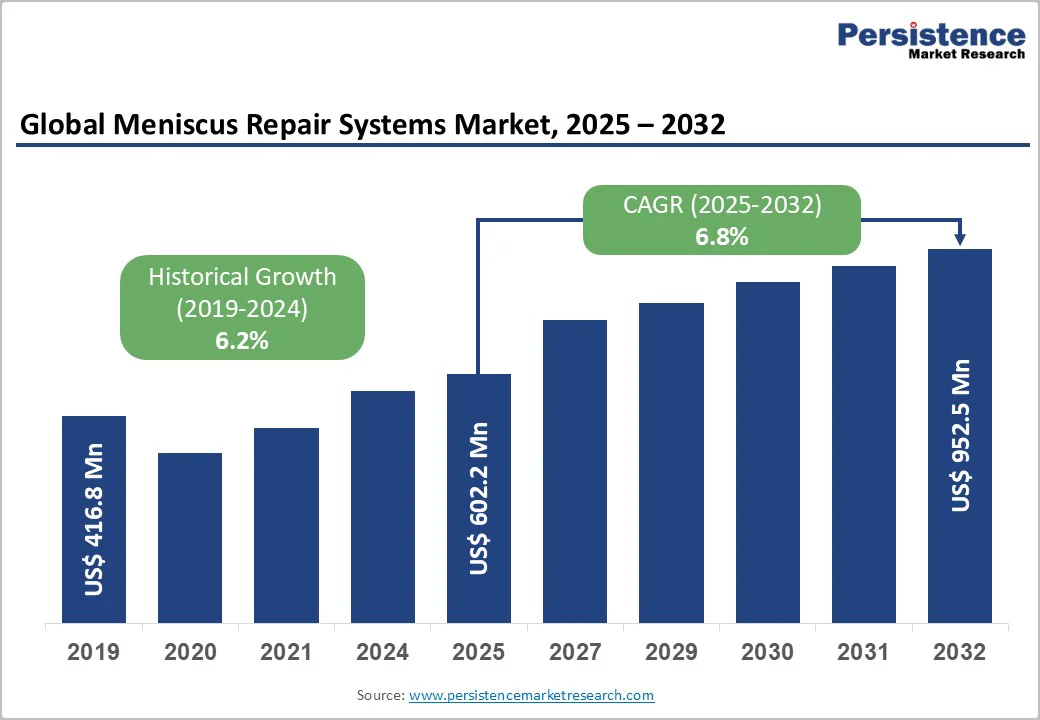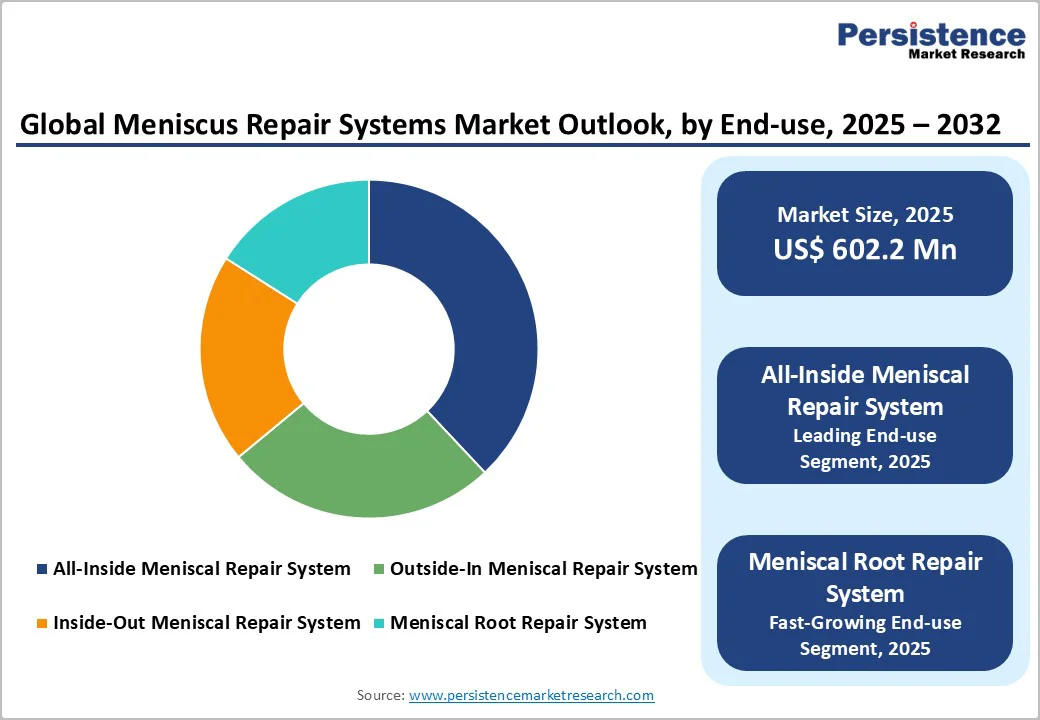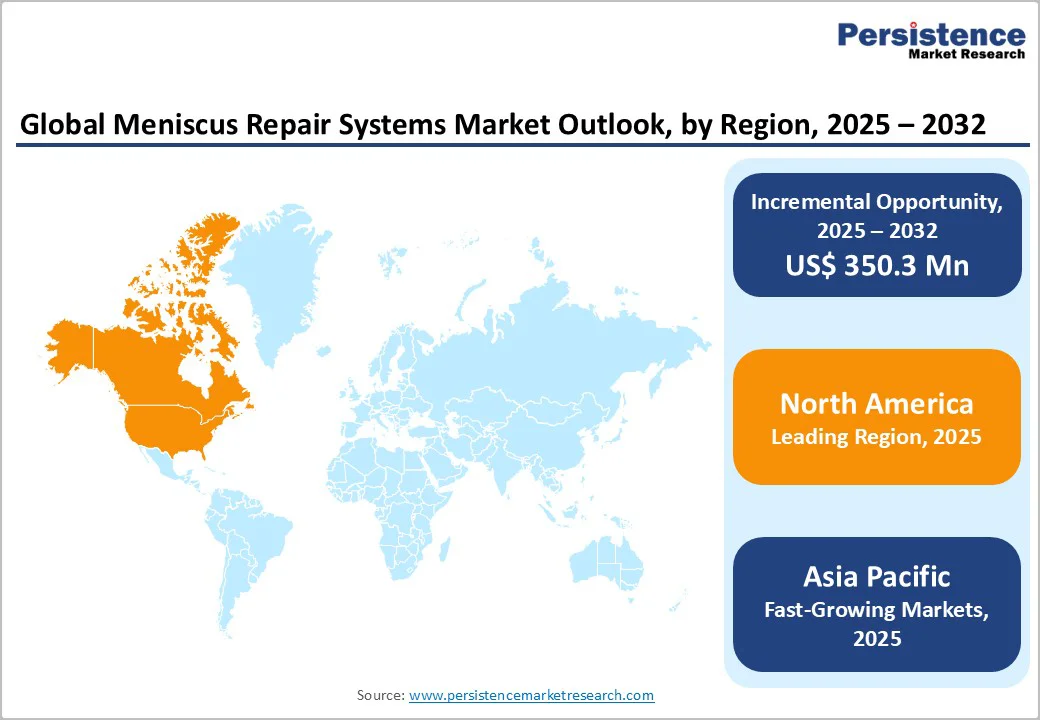ID: PMRREP27646| 194 Pages | 10 Dec 2025 | Format: PDF, Excel, PPT* | Healthcare

The global meniscus repair systems market size is valued at US$602.2 million in 2025 and is projected to reach US$952.5 million by 2032, growing at a CAGR of 8.1% from 2025 to 2032.
The growing prevalence of knee osteoarthritis and awareness of minimally invasive orthopedic procedures. These systems, including sutures, implants, and devices, enable precise meniscus repair, promoting faster recovery and improved joint function.
Technological advancements such as bioabsorbable implants, all-inside repair devices, and enhanced arthroscopic techniques are expanding treatment options. Hospitals, orthopedic clinics, and sports medicine centers are the primary end-users.
| Key Insights | Details |
|---|---|
| Meniscus Repair Systems Market Size (2025E) | US$602.2 Mn |
| Market Value Forecast (2032F) | US$952.5 Mn |
| Projected Growth (CAGR 2025 to 2032) | 6.8% |
| Historical Market Growth (CAGR 2019 to 2024) | 6.2% |

Meniscus tears frequently result from sports injuries, with athletes in sports like football, soccer, and basketball being particularly susceptible. Knee injuries are common among athletes, making timely diagnosis and initial treatment crucial. Young athletes often suffer from meniscus tears, one of the most prevalent injuries in this group.
Additionally, individuals engaged in regular physical activities, such as military personnel, face a higher risk of musculoskeletal injuries, including meniscus tears. The rising number of sports injuries, driven by increased youth participation in sports, is anticipated to drive the growth of the meniscus repair systems market in the years to come.
The high cost associated with meniscus repair surgeries poses a significant challenge to market growth. These costs encompass various factors, including surgical procedures, medical equipment, hospital stays, and post-operative care. The financial burden on patients and healthcare systems can thus deter some individuals from seeking timely treatment or opting for advanced surgical techniques.
Moreover, insurance coverage and reimbursement policies vary, influencing patient access to expensive procedures. The disparity in affordability across different regions further exacerbates these challenges, particularly in emerging economies where healthcare resources may be limited.
Continued innovation in minimally invasive surgical techniques, such as robotic-assisted surgery and advanced imaging modalities, has the potential to enhance precision and improve patient outcomes. Integration of biologics, such as growth factors, stem cells, and tissue engineering, offers opportunities to enhance tissue healing and ensure the long-term durability of repairs.
Additionally, the development of personalized treatment approaches based on patient-specific factors like age, activity level, and tear location can optimize surgical outcomes and increase patient satisfaction. These opportunities underscore a dynamic market landscape where innovation, collaboration, and strategic initiatives are crucial for companies aiming to capitalize on the growing demand for effective meniscus repair systems globally.
The All-Inside Meniscal Repair System commands the highest market share due to its minimally invasive nature, which reduces surgical time, postoperative pain, and recovery duration. Unlike Inside-Out or Outside-In techniques, it eliminates the need for additional incisions, lowering the risk of neurovascular injury. Its compatibility with advanced arthroscopic procedures and bioabsorbable implants further enhances precision and patient outcomes.
Surgeons favor this system for its ease of use, efficiency, and ability to treat complex meniscal tears effectively. Growing patient preference for faster recovery, coupled with rising sports injuries and orthopedic procedures, drives widespread adoption of all-inside repair systems globally.
The Hospitals segment leads the meniscus repair systems market due to its well-established infrastructure, availability of advanced surgical facilities, and access to skilled orthopedic surgeons. Hospitals handle a high volume of knee injury cases, including complex meniscal tears requiring sophisticated repair systems.
They also offer comprehensive postoperative care, imaging, and rehabilitation services, enhancing patient outcomes. Additionally, hospitals are preferred for both elective and emergency orthopedic procedures, attracting patients who seek reliable, high-quality care.

North America leads the global meniscus repair systems market, driven by advanced healthcare infrastructure, high adoption of minimally invasive arthroscopic procedures, and a large patient pool with sports-related and degenerative knee injuries. The U.S., as the regional powerhouse, contributes the majority of demand due to rising sports participation, an aging population prone to meniscal tears, and strong healthcare expenditure.
Continuous innovations in all-inside repair devices, bioabsorbable implants, and enhanced surgical tools further strengthen market dominance. Favorable reimbursement policies, well-equipped hospitals, and specialized orthopedic centers make North America the most established and high-revenue-generating region in the meniscus repair systems market.
Asia Pacific meniscus repair systems market is emerging rapidly, driven by increasing sports injuries, a rising geriatric population, and expanding healthcare infrastructure. Countries like China, India, Japan, and South Korea are witnessing growing demand for minimally invasive orthopedic procedures.
Local manufacturers are enhancing product availability, reducing costs, and improving access, while increasing awareness of advanced arthroscopic repair techniques supports adoption. Rising healthcare spending, government initiatives, and expanding insurance coverage further stimulate market growth.
The combination of a large patient pool and improving medical facilities positions Asia-Pacific as a high-potential, fast-growing region in the global meniscus repair systems market.

The global meniscus repair systems market is highly competitive, driven by continuous technological innovation, product differentiation, and the adoption of minimally invasive procedures.
Companies focus on developing advanced repair devices, including all-inside, inside-out, and bioabsorbable systems, to enhance surgical efficiency and patient outcomes. Strategic initiatives such as research and development, clinical training programs, and collaborations with hospitals and orthopedic centers strengthen market positioning.
The global meniscus repair systems market is valued at US$602.2 Mn in 2025.
Increasing sports participation, road accidents, and age-related joint degeneration contribute to higher meniscus tear cases.
The global market is poised to witness a CAGR of 6.8% between 2025 and 2032.
Growing healthcare infrastructure and rising orthopedic awareness in Asia-Pacific, Latin America, and the Middle East present untapped markets.
Arthrex, Inc., Johnson & Johnson, Smith & Nephew plc, Healthium Medtech, and others.
| Report Attribute | Details |
|---|---|
| Historical Data/Actuals | 2019 - 2024 |
| Forecast Period | 2025 - 2032 |
| Market Analysis | Value: US$ Mn, Volume: Units |
| Geographical Coverage |
|
| Segmental Coverage |
|
| Competitive Analysis |
|
| Report Highlights |
|
By Product Type
By Clinical Application
By End-user
By Distribution Channel
By Region
Delivery Timelines
For more information on this report and its delivery timelines please get in touch with our sales team.
About Author